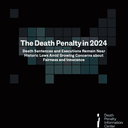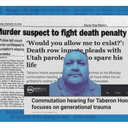
Corrections personnel who participate in executing prisoners experience emotional trauma so profound that it changes their views about capital punishment, a National Public Radio (NPR) investigation has found.
For stories broadcast on All Things Considered and posted on NPR’s website, reporter Chiara Eisner (pictured) interviewed 26 current or former corrections workers and others who had been involved in executions carried out by seventeen states and the federal government. “Most of the workers NPR interviewed reported suffering serious mental and physical repercussions,” Eisner wrote. “But only one person said they received any psychological support from the government to help them cope.”
“There was more than one casualty,” Oregon Department of Corrections spokeswoman Perrin Damon, who helped coordinate two executions in the state, told NPR. “More people are involved than anyone understands,” she said.
The people Eisner interviewed included “executioners, lawyers, correctional officers, prison spokespeople, wardens, corrections leaders, a researcher, a doctor, an engineer, a journalist, and a nurse.” Most, she said, reported experiencing psychological and physical effects from their jobs.
The experience of participating in an execution, Eisner wrote, “was enough to shift many of [the prison workers’] perspectives on capital punishment.” After having worked on executions, 20 of the 26 people Eisner spoke with, said they now oppose them, including 13 who had previously supported the death penalty. None of the 16 people who had personally witnessed an execution “expressed support for the death penalty afterward,” she wrote, “including those who went into the chamber supporting it.
Catarino Escobar, a former correctional officer on the execution team for Nevada State Prison, was asked to play the role of the condemned prisoner in a practice run or a gas-chamber. Strapped to a gurney alone inside the cramped chamber, the execution suddenly felt real. “I wasn’t acting or playing. I believed that I was being executed,” he said.
Ron McAndrew, a former warden at the Florida State Prison, recounted witnessing the botched electric chair execution of Pedro Medina from inside the death chamber in 1997. During the execution, Medina’s head caught fire. Although McAndrew could not stop the execution, he feels responsible for what occurred. “After I was able to step away from it and look back at it, that’s when things got pretty solemn for me. It caused me to reexamine who I was as a human being,” said McAndrew.
Allison Miller, a public defender who represents clients charged with murder in Florida, described the trauma she still experiences as a result of having a client sentenced to death. When her client, Markieth Lloyd, was sentenced to death, she felt that she had failed him and failed her toddler daughter who had said “I hope you save Mr. Markeith.” She suffered hair loss, insomnia, irritability, anxiety, and dissociation from daily experiences. “I cannot underscore what it feels like to stand there and ask 12 people to not kill somebody. It broke me a lot,” Miller said. “I failed in this godly task that I was given.”
What Frank Thompson, a former superintendent at Oregon State Penitentiary, noticed about the negative impact executions had on his staff shifted his view of the death penalty. Thompson initially was a proponent of the death penalty. Growing up in the segregated South, he remembered hearing the news of Emmett Till’s lynching in Mississippi and believed that people who committed murder deserved to die. However, when he observed the toll executions took on his staff, his changed his views. “It does no more than increase the number of victims while producing no positive outcomes,” Thompson said.
Eisner’s investigation draws on prior reporting she had done in South Carolina for the newspaper, The State. There, she reported on the life-altering trauma involvement in executions produced for execution team members, a prisoner warden, and the death-row doctor. The “culture of secrecy,” as Eisner describes it in her new report, “tends to keep [execution workers] quiet long after they leave their posts,” she wrote.
“Nobody talked about it,” Escobar told Eisner. Not even his family knew what he did in putting prisoners to death “We all knew to keep it silent,” he said.
In a November 21, 2022 commentary in the journal Verdict Justia, Amherst College Associate Dean Austin Sarat noted that “the more the American public learns about [the problems with the death penalty] the less it likes what it sees.” Eisner’s reporting, he says, “confirms … that those who are closest to the death penalty system have a similar reaction.”
“The more that the veil of secrecy is pulled back, the less likely anyone is to regard capital punishment as appropriate or humane,” Sarat wrote. “The more Americans know, the more likely we are to feel contempt for a cruel punishment that itself deserves to die.”
Chiara Eisner, How working on prison executions harms people and changes their views : NPR, NPR, Nov. 16, 2022; Austin Sarat, With America’s Death Penalty, New Evidence Shows that Familiarity Breeds Contempt, Verdict Justia, November 21, 2022.



